Sprawl
Is Sprawl Dead or Just Hibernating?
If the small city of Otsego, located 30 miles from Minneapolis, is a guide, sprawl may be poised to make a comeback as the housing market roars back to life. But larger indicators point to a withdrawal from sprawl.
New Initiatives Aim to Slow Spread of Sprawl Across Mexico
Though 78 percent of Mexico’s population is urban, for the past three decades it's been importing a disastrous development pattern from its northern neighbor - urban sprawl. A new set of institutions and policies are aimed at reversing the trend.
Is Turnabout Fair Play?
If American politicans and bureaucrats had favored public transit or pedestrians as aggressively as they favored cars in the 20th century, public policy would be very different indeed.
Should Cities Mandate Yards?
In communities across the U.S., setback requirements and lot coverage maximums mandate acres of private open spaces. Eliminating such requirements could produce more affordable and more eco-friendly places, argues Matthew Yglesias.
Upward Mobility Correlates to Walk Score
New data supports Paul Krugman's contention that sprawl inhibits the American Dream.
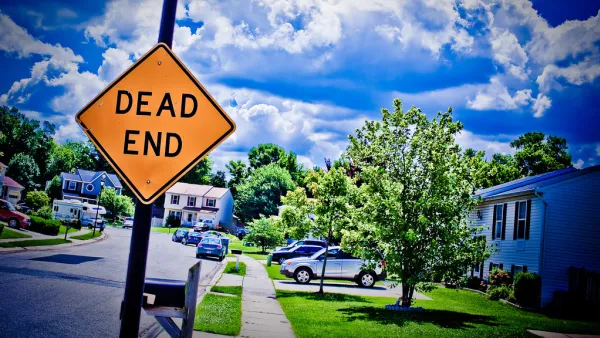
Suburban Sprawl Reaches the End of the Cul-de-Sac
The Washington Post speaks with Leigh Gallagher, author the new book “The End of the Suburbs”, about the decline of America's suburbs, models for suburban reinvention, and the correlation between neighborhood form and health and happiness.
The Positive Energy Potential of Suburban Sprawl
What if most cars were electrics, most electricity was generated locally, and new development was required to have solar? Would this paradigm make sprawl more energy sustainable than compact growth? A new paper argues yes.
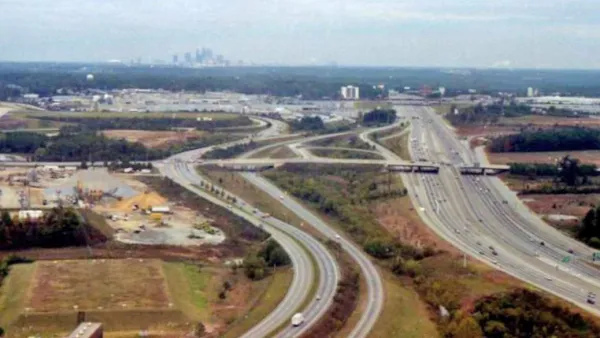
Bemoan Atlanta, as Well as Detroit, Writes Columnist
New York Times columnist Paul Krugman looks at two great American cities, one losing population for decades and now filed for bankruptcy, the other growing rapidly but through sprawl, not smart growth. Yet Atlanta suffers lower social mobility.
Lack of Walkability in Suburban Areas Threatens Kids' Safety, Health
A recent fight over school-bus service in Loudoun County, Virginia highlights the ways in which suburban growth patterns hamper walkability and harm the health of children.
In Key Ruling, Court Orders Study of Highway Expansion's Effect on Sprawl
A federal court has ruled that a proposed highway expansion said to be the largest single transportation project in Wisconsin history must consider regional impacts (on sprawl and transit-dependent populations) in its environmental analysis.

New Urbanism's Chief Regret?
In his fifth entry in a lengthy examination of the successes and failures of New Urbanism, Peter Katz looks at one of the movement's key blindspots: the failure to help improve the processes and practices of local governments.
In America's Cities, the Better-Off Trade Retail for Restaurants
The replacement of retail establishments with restaurants in America’s urban centers has a demographic slant.
Suburbs and Exurbs Were Hit Hardest by Great Recession
A new report from the Brookings Metropolitan Policy Program shows that areas located 10-35 miles from America's central cities sustained far higher job losses during the recession, staunching the sprawl of people and employment.
America's Surprising Springs of Sprawl
Although urban living has been making a comeback throughout the United States, "sprawl still dominates new construction in emerging metro regions in certain parts of the country," says Kaid Benfield. He looks at the areas where sprawl still rules.
Slow Growth of Albuquerque's Answer to Sprawl Raises Questions
Stan Alcorn checks up on the status of Mesa del Sol, a 12,900-acre public-private project that broke ground outside of Albuquerque in 2006, and was planned to be the largest New Urbanist development in the Southwest.
Healthy, or Unhealthy, by Design
We've engineered physical activity out of our daily lives but it need not be a chronic condition. Hazel Borys points to recent suburban retrofits for ways to get moving again.
The Life and Death of the Suburban Paradigm
A new article by city historian Graeme Davison traces the rise and fall of the suburban paradigm from its ideological roots in Victorian England to its current backlash.
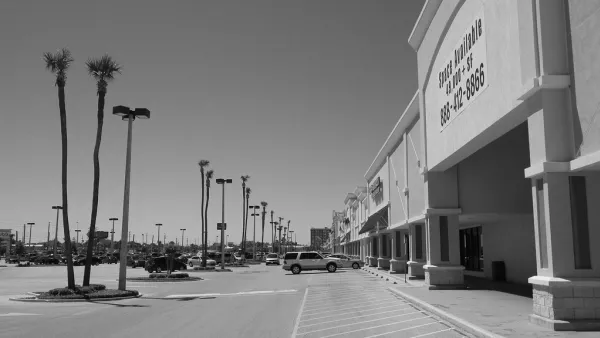
Driven into Poverty: Walkable Urbanism and the Suburbanization of Poverty
David Moser pens a compelling essay that examines the ways in which sprawling auto-dependent land use patterns exacerbate poverty. As more low-income individuals and families are pushed to the suburbs, "this problem is gaining urgency."
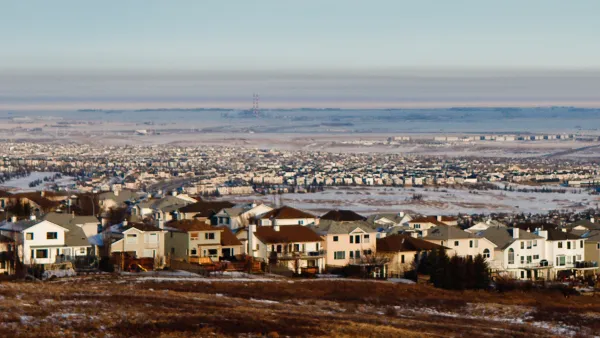
Reining in Sprawl Won't Be Easy; One of Canada's Worst Offenders Shows Why
With its progressive mayor and recent examples of exemplary architecture and urbanism, you'd think alternatives to sprawl would be an easy sell in Calgary. Unfortunately, you'd be wrong, says Christopher Hume.
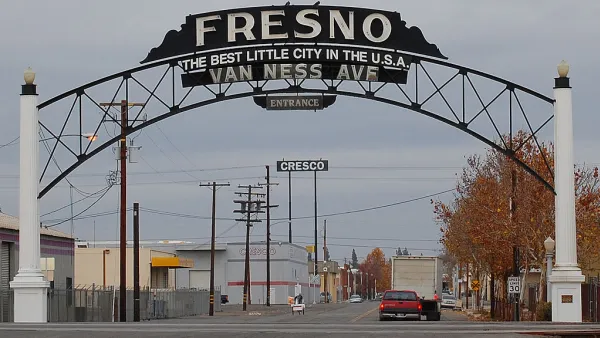
Can a 'Poster Child for Sprawl' Turn Itself Around?
In a video documentary, Matthew Gordon examines the elements of Fresno's General Plan update, which seeks to reorient the city around a more sustainable urban form, and turn around the fortunes of one of the country's most impoverished cities.
Pagination
Urban Design for Planners 1: Software Tools
This six-course series explores essential urban design concepts using open source software and equips planners with the tools they need to participate fully in the urban design process.
Planning for Universal Design
Learn the tools for implementing Universal Design in planning regulations.
EMC Planning Group, Inc.
Planetizen
Planetizen
Mpact (formerly Rail~Volution)
Great Falls Development Authority, Inc.
HUDs Office of Policy Development and Research
NYU Wagner Graduate School of Public Service


































